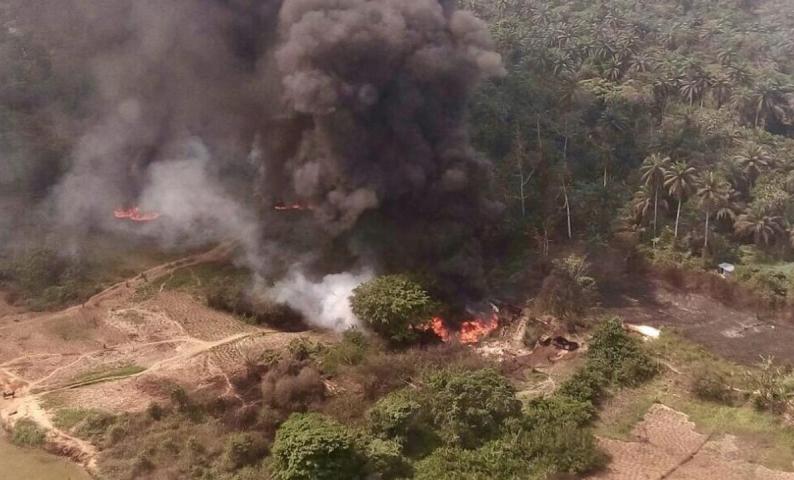FEATURES
Tinubu’s Monetary Policy Focus and the Fate of Naira

One of the major decisions taken by President Bola Tinubu on assumption of office on May 29, after removal of petrol subsidy, was the suspension of the governor Central Bank of Nigeria (CBN), Mr Godwin Emefiele.
The Secretary to the Government of the Federation (SGF), Sen.
George Akume, who announced Tinubu’s decision to suspend Emefiele on June 9, directed the deputy governor, Operations Directorate, Mr Folashodun Shonubi to act as governor.On June 14, the apex bank abolished the multiple Foreign Exchange (FX) market.
In a statement by Angela Sere-Ejembi, Director, Financial Markets, the CBN announced that all segments of the FX market were collapse into the Investors and Exporters (I&E) window.
This indicated that the apex bank and its monetary policy functions were integral to economic policy direction of the new president.
Experts are optimistic that the policy decision to unify the exchange rates, experts will sanitise the forex market.
The I&E exchange rate window hit N755 to the dollar shortly after, implying a 21 per cent depreciation of the Naira compared to the previous official rate of N463 to the dollar.
By this development, buyers and sellers of foreign currency in the official FX market were now allowed to quote rates they find comfortable.
This is against previous practice where rates were dictated by the CBN
Some stakeholders, however, interpreted it to imply that the Naira, which has suffered serial depreciation and devaluation over the decades, was being effectively floated.
If floated the value of the currency would be subjected to market forces of demand and supply.
According to the experts, unified and flexible exchange rate regime will help boost investor confidence, increase foreign inflows, reduce import costs, and ease pressure on the naira.
A financial expert, Prof. Uche Uwaleke, said that it was commendable for the CBN to unify the country’s exchange rate.
Uwaleke, a Professor of Capital Market at the Nasarawa State, Keffi, however, cautioned against a sudden free float of the Naira.
According to him, the economic fundamentals required to support a naira float are still very weak, especially in relation to sources of forex.
“Let me say upfront that I support the unification of exchange rates, which makes for a more transparent forex market.
“But I think that the CBN should implement it in a way that does not cause massive distortions in the general price level.
“It is rather early to bank on sustainable capital inflows from foreign direct investments due, in part, to insecurity and the overall unconducive environment of doing business in Nigeria,”.
He said that sudden naira devaluation may draw foreign portfolio investments, which was part of the reason the stock market was surging.
“But we also know that portfolio investments are not money and do not represent a sustainable source of forex inflows,” he said.
He said that the unification of exchange rates should not be a one step process but should be implemented over a period of time, however short it may be.
According to him, empirical evidence suggests that reforms are more successful when they are sequenced and implemented in phases.
“This is against the backdrop of the oil subsidy removal, which, taken together, can result in galloping inflation and rising poverty level.
“So, while fiscal and monetary policy reforms are welcome, absolute care should be taken to strike the right balance and minimise their unintended consequences,”.
Some other stakeholders argue that the disparity in exchange rates provided an avenue for people with access to dollars to buy at the official rate and resell at the black market.
They said that many millionaires were created through that distorted system.
According to Dr Chijioke Ekechukwu, Managing Director, Dignity Finance and Investment Ltd., the unification of the exchange rate and floating of the foreign currency market has come as a welcome development.
“With this, Deposit Money Banks can now go source their own funds and sell to users at their own rate and margin. This is going to bring a rate war amongst them, which will force the rates lower.
“Merging the rates will reduce arbitraging, speculation, and curb multiple malpractices in the market ”.
Ekechukwu, however, said that rates would remain reasonably high in the short run before they drop; and for a higher supply of foreign currencies is achieved.
“This may affect the cost and prices of imported products, including petroleum products. It may increase hardships and retain a high inflation rate,” he said
Dr Muda Yusuf, Director, Centre for the Promotion of Private Enterprise (CPPE), explained that FX unification was not a devaluation policy.
Rather, he said, it is a normalisation of the foreign exchange policy regime and an adjustment of rate to reflect the fundamentals of demand and supply.
According to him, in the short term, a depreciation of the currency should be expected in the official window.
“This is because of the huge backlog of demand but as the market conditions normalise and move towards equilibrium, the rate would moderate, ” he said.
He said the new policy regime would boost inflows and strengthen the supply side amidst elevated investors’ confidence.
“The component of forex demand driven by arbitrage, rent seekers, speculators and other economic parasites would also fizzle out, thus restoring stability to the forex market.
“It would be dynamic, and the naira will appreciate or depreciate depending on the fundamentals,” he said.
The CBN Deputy Governor, Economic Policy Directorate, Kingsley Obiora , however, said the apex bank had no plans to set the naira on a totally free float, as no country runs a completely free float.
Clarifying recent monetary policy decisions of the bank Obiora said countries do not usually subject their currencies to free float.
“There is no country in the world, even the U.S. that has a completely free float. We are allowing the market itself to set a price.
“It may be too early to determine if the naira’s exchange rate to the dollar has bottomed out,” he said.
He added that the CBN had not intervened in Nigeria’s FX markets since the new policies were introduced.
As Tinubu hits the ground running with major monetary policy decisions, Nigerians are hopeful that the changes will enhance their wellbeing by strengthening the economy. (NAN)
FEATURES
Rise In Male Hair Braiding: Fashion or decline in African values?

In recent years, the landscape of men’s fashion and grooming in Nigeria has seen a notable shift, with hair braiding emerging as a significant trend among young men.
Once seen as a style reserved for women, braided hairstyles are now redefining masculinity on the streets of Nigeria.
The practice has now evolved into a form of cultural expression, artistry, and personal identity for Nigerian males.
This growing trend is not just about fashion; it challenges cultural stereotypes, sparks conversations about gender norms, and signals a broader shift in how young Nigerian men see themselves and their identities.
Speaking on the trend, contributors appraised several factors contributing to the drift among young men in Nigeria society.
Mr Chinemerem Ndinojue, a youth and fashion enthusiast, described hair as a deep personal expression of identity.
“To me, hair is an extension of one’s personality; in African history, braids were more than fashion — they were symbols of resistance, identity, and even communication during the era of slavery.”
Ndinojue argued that, modern youths, particularly the Gen Z, use braids and other hairstyles to reflect creativity and stand out in industries like fashion and entertainment.
“Many of us are into music, design, content creation and our appearance is part of the brand; our parents rocked Afros in their time.
“It is the same expression in a different era; you cannot judge a person’s morality by their hairstyle,” he said.
However, Mr Michael Samson, a civil servant, sees the trend differently, describing it as a departure from African tradition and an influence of misguided westernisation.
“Our traditions have been replaced by modern civilisation; most of these boys are not celebrities; yet, they spend thousands on hair that serves no purpose.
“Worse still, some use these looks to cover fraudulent activities.’’
He cited an incident at a bank where a teenager, allegedly involved in internet fraud, claimed to have earned in a month what an older man earned in a lifetime.
“Such wealth without value is what leads to this arrogance; many use these styles to gain attention, not out of professionalism,” he said.
Echoing similar sentiments, Mrs Blessing John, another civil servant, said male hair braiding undermines cultural and moral standards.
“For me, it is not encouraging; we are Africans with strong cultural values; in our tradition, men do not braid their hair; even in professional spaces namely medicine, law, engineering, you do not see such hairstyles; there is a reason for that.”
She warned that many young men who braid their hair may be involved in societal ills such as drug abuse and cultism.
“We need value reorientation; parents must go back to teaching their children the right path; we must not forget where we come from,” she said.
Meanwhile, Mrs Ijeoma Azubuike-Okigbo, a communications professional, offered a more nuanced view.
While she admitted personal reservations about male braiding, she acknowledged the growing influence of pop culture.
“Young people today look up to personalities like VeryDarkMan among others who braid their hair and still command respect.
“If the society begins to accept it widely, it might one day become a part of our evolving culture.”
She said that many parents even took their young male children to salons for braids, suggesting the trend was already gaining ground across families.
“Ultimately, hair is natural; how one chooses to style it is personal; society is changing, and this may be part of that evolution,” she said.
Mr Toks Adesanya, a community elder, expressed strong disapproval over the rising trend of hair braiding and dreadlocks among young Nigerian males, describing the practice as a “taboo” and a deviation from cultural norms.
Adesanya lamented what he referred to as the erosion of African values and the shift in traditional masculinity.
He argued that hair braiding in men was not only alien to the culture but also reflective of a larger societal breakdown.
“It is a taboo for a man to braid his hair; when I see a boy or a man doing such things, I consider it a disgrace and a deviation from our tradition.
“Such hairstyles are not only culturally inappropriate but also expose young men to unnecessary suspicion by law enforcement.
“Thank God, the Special Anti-Robbery Squad of the Nigeria Police is no longer around; many young men would have fallen victim because such looks make them easy targets; police often associate such appearance with cybercrime or cultism.’’
Adesanya recalled a personal experience from his youth, when he briefly curled his hair to attend a party, only to be severely reprimanded by a family member.
“I felt accepted at the party, but when I got home, someone close to the family expressed deep disappointment; she said I had disgraced manhood; I felt ashamed and removed the curls the next day.”
He also attributed the trend to poor parenting, environmental influence, and a lack of religious and societal guidance.
“Our society no longer checks excesses; parents are absent, churches and mosques are silent, and this silence is taken as approval.
“Even in job interviews, appearances matter; a man with braids or dreadlocks may not be taken seriously if he should appear in such manner for job interviews,” he said.
Recently, Gov. Umar Bago of Niger banned wearing of dreadlocks among other things due to the rise of insecurity in the state.
Bago ordered security agents to clamp down on thugs and those abetting them in disrupting public peace in Minna, the state capital where violence had become a daily occurrence.
He also directed the arrest of people wearing dreadlocks, following a series of calls by terrorised residents of Minna to curb the worsening thuggery that had claimed the lives of many innocent people.
The governor said that thugs had turned the streets of Minna into a battleground since he took over leadership of the state.
As the debate continues, the question remains, is male hair braiding in Nigeria a fading of traditional values or an embrace of modern self-expression? (NANFeatures)
FEATURES
Miss Valdeen N. Pierre Honored with Humanitarian Award at the 2025 National Humanitarian Summit

In a remarkable celebration of humanitarian service and strategic collaboration, Miss Valdeen Pierre , Country Director – United State ; A New Thing International foundation ; was honored with the Humanitarian Award at the prestigious National Humanitarian Summit 2025, held at the Shehu Musa Yar’Adua Centre, Abuja.
The award recognizes Miss Pierre’s and other humanitarian leaders unwavering commitment to humanitarian causes, particularly her collaboration with A New Thing International Foundation on the SOBE Project (School Outreach for Better Education) across Sokoto, Kebbi, Plateau, Niger States and the FCT.
Her efforts have significantly contributed to improving access to quality education and raising awareness about social vices among schoolchildren in underserved regions.The summit drew an esteemed audience comprising multiple stakeholders across the humanitarian value chain, including the Minister of Youth Development, Minister of Humanitarian Affairs, Special Assistant to the President on Humanitarian Affairs, the First Lady of Kwara State, First Lady of Zamfara State, representatives of United Nations Humanitarian Agencies, NGOs, INGOs, and other key players in the humanitarian sector.

The event featured a vibrant mix of panel discussions, keynote addresses, and the unveiling of strategic development plans aimed at strengthening collaborative impact across Nigeria and beyond.
In his vote of thanks, Ambassador Kenneth Anetor, the Executive Director of A New Thing International Foundation and Chairman of the Planning Committee, delivered a passionate closing speech. He commended the honorees and stakeholders, issuing a clarion call for deeper collaboration and renewed commitment to advancing strategic organizational development goals. His rousing remarks inspired attendees to rise to the moment and forge stronger partnerships for sustainable impact.
Ambassador Anetor also extended profound appreciation to the summit’s convener, Ambassador Michael Timothy, of the Funmilayo Health Foundation Africa, for the opportunity to serve as Chairman of the Planning Committee, and for creating a platform that celebrates excellence in service and drives transformative conversations in humanitarian work.
The National Humanitarian Summit 2025 stands as a milestone in Nigeria’s journey toward inclusive, people-centered development, with Miss Valdeen Pierre’s recognition serving as a beacon of hope and an example of the power of global partnership in humanitarian efforts.
For media inquiries , information, or donations please contact:
Email: anewthingworldwide@gmail.com
Phone: +2347037474611
Website: www.antworldwide@gmail.com
FEATURES
A Pope’s Funeral and New Leadership Paradigm
By Dakuku Peterside
The world came together on a warm April morning in Rome. Under Bernini’s wide colonnade, a simple wooden coffin lay, almost shy against the grand marble of St Peter’s. It held the body of Jorge Mario Bergoglio, better known as Pope Francis; it also carried a final message, passed without words.
As I watched the funeral, I wondered if the message would be clear to leaders in places where leadership is often about show, instead of service. Nigeria, my country, came to mind, because its people long for leaders who serve with humility, rather than rule with power.At first glance, comparing a Pope to political leaders might seem unconventional, but important commonalities exist. Upon reflection, parallels are audacious: a Catholic pontiff and a republic’s president inhabit very different orbits. Yet, both preside over institutions that store immeasurable wealth – monetary, cultural, spiritual – and both command loyalties that can bless or wound the human spirit. The difference lies in the currency they spend. Francis traded almost exclusively in moral capital. His motorcade rarely stretched beyond a small Fiat. He lived in a guesthouse, took meals in a communal dining hall, and instructed that his funeral expenses be redirected to shelters for people experiencing homelessness.In stark contrast, many political leaders, notably in Nigeria, have consolidated power through patronage, wealth accumulation, and coercion, severely damaging their credibility and the public’s trust. Nigerian power, by contrast, is often measured in sirens, convoys, and security votes; in the distance a public office holder can place between himself and the exhaust of everyday life. The funeral invited a radical thought: What if legitimacy flowed from humility, not from the choreography of importance? This stress on the importance of humility in leadership could enlighten and provoke reflection on governance.Humility, though, is not a mannerism. It is a decision made daily, a refusal to situate oneself above the collective story. Francis’ last request, “bury me outside the Vatican walls”, was a slight tectonic shift, the first such break with tradition in over a century. It told pilgrims and presidents alike that holiness is not the property of marble tombs but of living deeds. Pope Francis was buried in a simple wooden coffin, instead of the traditional three-nested casket, symbolising a life dedicated to humility and service. This act is probably the first of its kind in papal history. This powerful statement of reform and decentralisation challenged entrenched traditions that maintain privilege.Nigerian leaders, accustomed to the trappings of power and privilege, could profoundly benefit from embracing servant-leadership that prioritises citizens’ welfare above personal gain. Imagine for a moment a Nigerian governor choosing to sleep occasionally in the wards of a rural clinic that lacks electricity, a senator commuting without escorts, or a budget speech opened with an apology to those whose dreams are still postponed. Such gestures, inspired by Pope Francis’ humility, would earn ridicule from cynics trained by years of theatrical piety, yet they might also crack the granite of distrust that politics has laid around the citizen’s heart.Throughout his papacy, Francis consistently demonstrated simplicity, living modestly, rejecting extravagance, and continuously expressing empathy for ordinary people. For Nigerian political leaders, adopting similar modesty could substantially enhance their legitimacy, distancing them from the extravagant lifestyles that alienate them from the realities of the people they govern. By following PopeFrancis’ example, Nigerian leaders could bridge the gap between themselves and the citizens they serve, fostering a deeper connection and understanding.The scenes in Rome offered other lessons as subtle as incense. Refugees and cardinals knelt side by side; presidents exchanged the sign of peace; atheists joined murmured prayers. I thought of the Plateau and Benue, of plains made fertile by rivers and yet stained by cycles of reprisal killings, each side armed with grievances as old as maps. If a Pope’s funeral could fold the devout and the doubtful into the same silence, perhaps state ceremonies in Nigeria could be reimagined as platforms for reconciliation, rather than patronage. Symbols matter because they reach the imagination before the policy can touch the pocket. A wooden coffin whispered more convincingly than any communiqué on inclusive governance ever could.None of this is to canonise a man in hindsight; Francis was criticised, resisted, and sometimes misunderstood. Reform always bruises the edges of comfort. But in death, he achieved what many living leaders rarely managed: he convinced opposing camps to pause their quarrels long enough to say, “Thank you, Father.” The applause that rippled through St Peter’s Square did not celebrate power captured; it celebrated power surrendered. How extraordinary and disconcerting to think that the shortest route to influence might be the surrender of privilege.I wish to reference the testimony of Vinod Sekar, the Hindu philanthropist who once described being in the presence of “someone relentlessly good,” pointing to Pope Francis. Sekar confessed that holiness ceased to be a place, temple, mosque, or cathedral, and became instead a verb: to shelter, to include, feed. Nigeria’s streets are crowded with worship houses, yet the mood often betrays scarcity – the scarcity of trust, of light, of potable water, of the belief that tomorrow might be gentler than today. What if holiness were measured not by the decibels of our prayers but by the quality of our public schools and hospitals? What if fiscal policy became a beatitude, not just a technical tool or to score cheap political points but a source of broad social good?Authentic goodness, the kind that disarms calculation, cannot be legislated; it must be modelled. Leaders who publish their asset declaration unprompted, reject grandiose titles, and break bread with market women without cameras in tow, begin to tilt the atmosphere. And atmospheres are contagious. When a Pope chooses simplicity, bishops take notice; when a governor chooses public transport, commissioners start to wonder whether the show of might is worth its cost. A single act does not topple corruption, but it can short-circuit the logic that sustains it.Critics will argue that symbolism is cheap and that coffins and cassocks cannot patch roads or fund hospitals. They are right, unless the symbol changes the story, and the story changes the budget. A nation cannot legislate self-respect into its citizens, while its leaders accumulate properties in distant capitals. Neither can it ask for sacrifice, while official lips sip champagne at state banquets. The funeral in Rome stubbornly insisted that credibility is the one commodity no treasury can purchase; it must be earned in increments of integrity.As I write, the image of that lone coffin lingers, framed by sunlight and the tear-streaked faces of strangers who felt seen by a man in white. Power looked strangely like the vulnerability that morning, and history tilted, not dramatically, but perceptibly, toward the possibility that public office might again be synonymous with public service. I imagine a version of that morning unfolding on Abuja’s Eagle Square: no imported SUVs, no choreography of arrival times to signal rank, only leaders standing shoulder to shoulder with nurses, farmers, students, and the internally displaced. I imagine a moment when applause signals not relief that the ceremony is over but gratitude that the example is true. Perhaps that is naïve. Yet every durable reform was once a naïveté stubborn enough to outlive its ridicule.
The cypress boards of Francis’ coffin will one day fade, but the memory of his choices will migrate from anecdote to folklore, from folklore to benchmark. Nigeria, a country whose anthem pleads to “build a nation where peace and justice shall reign”, needs new benchmarks more urgently than new oil blocks. It requires the quiet scandal of servant leadership to make corruption look as outdated as a triple-nested casket. Nigerian leaders should embrace key principles drawn from Pope Francis’ life and funeral rites: humility that transforms rulers into servant-leaders; real and courageous reforms dismantling corruption; moral authority grounded in integrity and humility; inclusivity that fosters unity across ethnic and religious divides; and a legacy defined by public trust rather than accumulated wealth.Ultimately, Pope Francis’ funeral provided a profound narrative on leadership that Nigerian political figures must internalise. By embodying these principles, they can cultivate a governance system rooted in moral authority, transparency, and service, genuinely transforming their nation and securing a legacy that endures beyond wealth or power. I end where I began, in the quiet of that Roman square, listening to chants swell like a rising tide, watching a coffin slip into the basilica, and feeling the strange comfort of a paradox: the smaller the ego, the wider the circle of souls who find shelter beneath its shade. This truth, more than any doctrine, is the gospel political leadership must embrace if it hopes to bury an age of hollow grandeur and awaken a season of genuine hope.Dakuku Peterside, a public sector turnaround expert, public policy analyst and leadership coach, is the author of the forthcoming book, “Leading in a Storm”, a book on crisis leadership.






















